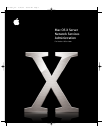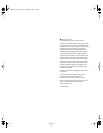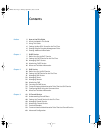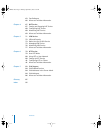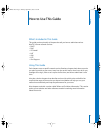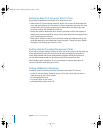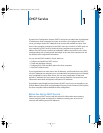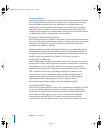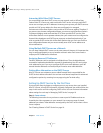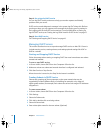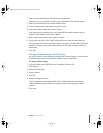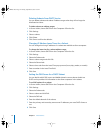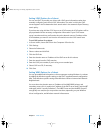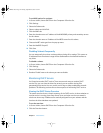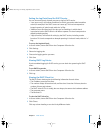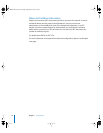
Chapter 1
DHCP Service
9
Interacting With Other DHCP Servers
You may already have other DHCP servers on your network, such as AirPort Base
Stations. Mac OS X Server can coexist with other DHCP servers as long as each DHCP
server uses a unique pool of IP addresses. However, you may want your DHCP server to
provide an LDAP server address for client auto-configuration in managed
environments. AirPort Base Stations can’t provide an LDAP server address. Therefore, if
you want to use the auto-configuration feature, you must set up AirPort Base Stations
in Ethernet-bridging mode and have Mac OS X Server provide DHCP service. If the
AirPort Base Stations are on separate subnets, then your routers must be configured to
forward client broadcasts and DHCP server responses as described previously. If you
wish to provide DHCP service with AirPort Base Stations then you can’t use the client
auto-configuration feature and you must manually enter LDAP server addresses at
client workstations.
Using Multiple DHCP Servers on a Network
You can have multiple DHCP servers on the same network. However, it’s important that
they’re configured properly as to not interfere with each other. Each server needs a
unique pool of IP addresses to distribute.
Assigning Reserved IP Addresses
Certain IP addresses can’t be assigned to individual hosts. These include addresses
reserved for loopback and addresses reserved for broadcasting. Your ISP won’t assign
such addresses to you. If you try to configure DHCP to use such addresses, you’ll be
warned that the addresses are invalid, and you’ll need to enter valid addresses.
Getting More Information on the DHCP Process
Mac OS X Server uses a daemon process called “bootpd” that is responsible for the
DHCP Service’s address allocation. You can learn more about bootpd and its advanced
configuration options by accessing its man page using the Terminal utility.
Setting Up DHCP Service for the First Time
If you used the Setup Assistant to configure ports on your server when you installed
Mac OS X Server, some DHCP information is already configured. You need to follow the
steps in this section to finish configuring DHCP service. You can find more information
about settings for each step in “Managing DHCP Service” on page 10.
Step 1: Create subnets
The following instructions show you how to create a pool of IP addresses that are
shared by the client computers on your network. You create one range of shared
addresses per subnet. These addresses are assigned by the DHCP server when a client
issues a request.
See “Creating Subnets in DHCP Service” on page 10.
LL2351.Book Page 9 Monday, September 8, 2003 2:47 PM



